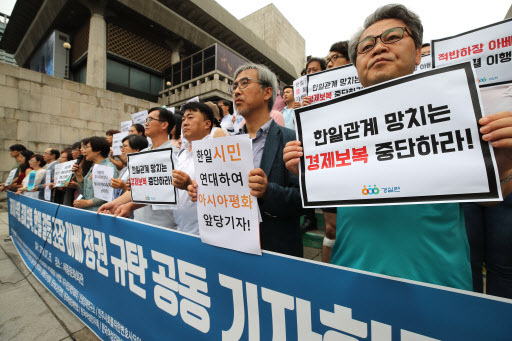S. Koreans slam Japan’s ‘whitelist’ decision, vow all-out boycott
By Ock Hyun-juPublished : Aug. 2, 2019 - 18:27
South Korean citizens and civic groups on Friday lashed out at Japan’s decision to remove their country from a “whitelist” of countries with preferential trading status and called on the Korean government to take stern action against it.

An association of 682 progressive civic groups, including the Korean Confederation of Trade Unions, called Japan’s move an “attack” on Korea’s economy and a threat to peace at a press conference held in front of the Japanese Embassy in Seoul.
“Going against the trend of building peace in East Asia, Japan’s move lays bare its willingness to push to militarize the country and place Korea under it as an economic and military partner, rather than atone for its history of aggression and colonial rule,” they said in a statement.
Earlier in the day, Japan’s Cabinet approved a proposal to strip Korea from the “whitelist” -- an apparent act of retaliation over recent Korean Supreme Court decisions siding with Koreans forced to work for Japanese companies during the colonial period -- in yet another blow to the neighbors’ already frayed relations.
Japan denies Seoul’s allegation that the export controls were imposed in retaliation for the court rulings.
The move follows Japan’s July 4 imposition of tighter restrictions on exports to Korea of three key materials necessary for the production of memory chips and displays.
The civic groups called for the abolition of the countries’ joint military intelligence-sharing pact -- known as the General Security of Military Information Agreement, which is up for renewal and requires a decision by Aug. 24 -- and the invalidation of the 2015 “comfort women” deal. Under the deal, Japan offered an apology and funds to the remaining Korean survivors of sexual slavery in its front-line military brothels. The deal fell short of the formal reparations demanded by the elderly survivors.
They plan to hold events condemning the Abe administration Saturday and Aug. 10, and to hold a large scale candlelight vigil at Gwanghwamun Square in central Seoul on Aug. 15 to mark Liberation Day.
Relations between the two neighbors have soured since Korea’s Supreme Court ordered Japanese companies to compensate Koreans forced into labor by the Japanese government before and during World War II.
Japan argues that all reparation issues stemming from its 1910-45 colonization of the Korean Peninsula have been settled under a 1965 treaty that normalized bilateral ties.
Ordinary South Koreans also expressed anger at Japan’s economic retaliatory measures.
“Germany apologized for its past wrongdoings. But Japan is not only denying them but also taking childish action such as economic retaliation. All Koreans cannot help but come together against Japan,” said Kim Min-jo, 31-year-old office worker.
“We should not be emotional, but countermeasures must be taken,” he said. “I will participate in a boycott of Japanese goods more aggressively and I am willing to hold up a candle (in the rally). The government should also deliver a strong message.”
The boycott of Japanese products is further spreading in protest against Tokyo’s export restrictions.
A Uniqlo store near Jongno 3-ga Subway Station in Seoul, which has been operating for the past 10 years, will close in October, triggering speculation that the boycott of Japanese apparel was a factor. Uniqlo has been a main target of the boycott after one of its executives said the movement would not last very long. The company later issued an apology.
Municipalities are also joining the protest.
The municipality of Gangnam-gu said Friday that it had decided to take Japanese flags down from major streets in the district -- Teheran-ro, Yeongdong-daero and Apgujeong Rodeo Drive -- to protest Japan’s move.

National flags of 137 countries around the world have been hung along the 3.6-kilometer Teheran-ro and 3.4-kilometer Yeongdong-daero as these streets form a center of international finance, trade and international exhibitions.
By Ock Hyun-ju (laeticia.ock@heraldcorp.com)
-
Articles by Ock Hyun-ju



![[Herald Interview] 'Amid aging population, Korea to invite more young professionals from overseas'](http://res.heraldm.com/phpwas/restmb_idxmake.php?idx=644&simg=/content/image/2024/04/24/20240424050844_0.jpg&u=20240424200058)














![[KH Explains] Korean shipbuilding stocks rally: Real growth or bubble?](http://res.heraldm.com/phpwas/restmb_idxmake.php?idx=652&simg=/content/image/2024/04/25/20240425050656_0.jpg&u=)

